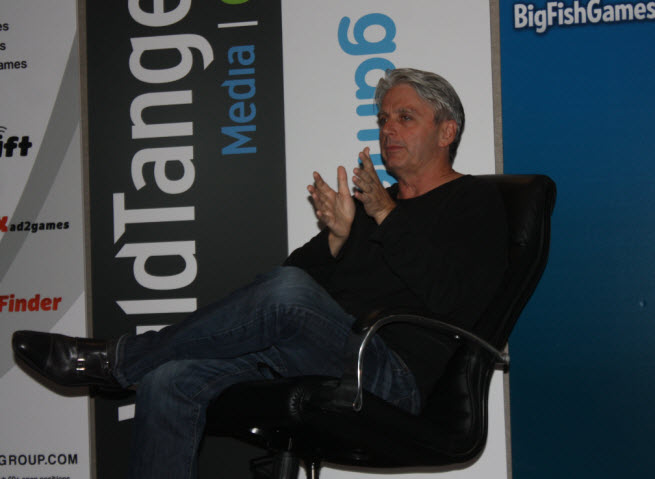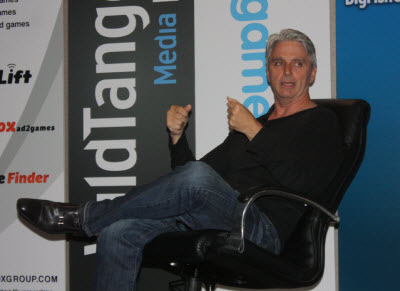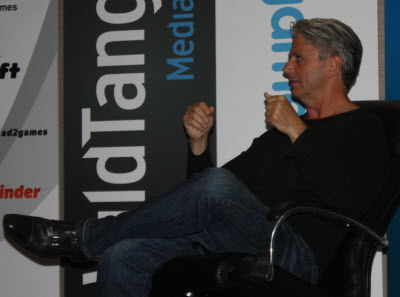Gaudiosi: When you look at casual gaming today, how different is the Facebook casual gaming experience compared to the mobile gaming experience?
Riccitiello: Let me start by saying I’m not entirely sure what a “Facebook gaming experience” really is. I play games on PC. I play games on my television through a console. I play games on touch devices – iPad and my Android phone. Each of those are very different. I think the most profound shift and driver in mobile is touch screens. Touch screens change an enormous number of things, and they aid in that simplicity I was talking about. It’s probably the biggest innovation in gaming since Atari – giving the consumer touch.
The ability to interact with the product in an intuitive way and getting rid of the complexity of a controller is a huge, huge thing. There have been a staggering number of great franchises built on that concept with new types of interfaces. Some very smart companies are taking games that used to work with controllers and keyboards and really thought that through. How to simplify and use the benefits of touch screens to yield a brand-new experience – companies that really thought that through have done very well. All you need to do is look at the top of the mobile charts to see who those companies are.
PC games, that’s my number one platform, for me personally. I love the keyboard and the mouse and the rest of it. I love the rich games that are played there. One of San Francisco’s companies, Kixeye, with their VEGA Conflict product, to me that’s a PC game. It plays like a PC game. It’s a great PC game. I’ve got all the assets that I’m building on one side and I’m going to war on the other. It’s a great PC game. I don’t know that it actually gets a lot from Facebook. At least from my perspective, there are touch-based mobile and tablet games, there are games that are best played on PC, and there are games that work well on a console. Games will go from device to device. I’m a Minecraft player, but I’ve never played it on console. I probably should. I just read that it made the top of the charts in the U.K., which means something is going on. I’m certainly missing something here.
But the question is, what does Facebook add in the middle for that? Historically, they’ve added a friends list and content discovery. Now, with Facebook Connect, we’re all using their discovery and friends list system, whether we’re on the platform or not. Right now they’ve announced their new mobile platform and what they’re going to do to try to support as a publisher. I think they need to do a better job of helping all of us understand what their value add is. Why is it better for a PC game to get it through Facebook? They’re blowing the numbers out and I’m sure they’re going to answer the question really well, but at least to me, it’s touch, PC, and console. The underlying hardware is the enabler for the type of game experience we can get. It’s very different to play a PC game, where the screen’s two feet in front of you, versus a TV, where it’s 15 feet in front of you. Screen resolution changes. Controllers change. But those are the three primary places that I look at.
Gaudiosi: I wanted to get your thoughts on how you see second-screen gaming impacting the business as we move forward with mobile.
Riccitiello: I’m now going to caution everybody that we should all collectively get a bottle of wine or a beer, because where I’m about to go is an area where no one really knows the answer. On the questions I’ve been asked so far, I feel like I have some advantage and a little bit of knowledge and I can say something. On this one I don’t really know.
I do know that I sit on my couch at home. I’m running Outlook on a PC over here looking at my e-mail. I’m playing a console game up on my TV. I might be playing Candy Crush on my tablet. I’m using multiple screens all the time. I think most of us are doing that in many different ways. I’ve seen some stupendous experiences with dual screens in console games, where you’re using a tablet or a phone as a secondary data input or just for information. The Nintendo DS was the first innovator there. But I don’t even know that we’re even scratching the surface as much as that we’re waving our hand over the surface that we’ve yet to scratch.
The concept of using the best screen in your house – the big TV – with your tablet or phone as a secondary input device or a data device or a touch device or a communication device is brilliant. Some of us may argue that all we’ll ever need is a tablet or a phone. You have HDMI wireless out into your television set. Your screen will be here, your controller will be there. That’s one example. Personally, I always found RTS on console impossible to play, because I need a second screen to figure it out. One of the reasons, in my view, that Command & Conquer didn’t do as well on console as it did on PC, or StarCraft didn’t do as well as it did on console as PC, is because you needed another data set. I would love to have my battle going on over here and move my troops over here as a gameplay idea. But again, I’m so far away, with that simple idea, from the many things we’re going to see.
The television is going to be used for mobile games going forward. I can’t tell you I know the exact mechanic. I can tell you that dual screen will be a really big idea, when you figure out a gameplay experience that is better when you’re using both.
VentureBeat's mission is to be a digital town square for technical decision-makers to gain knowledge about transformative enterprise technology and transact. Learn More



